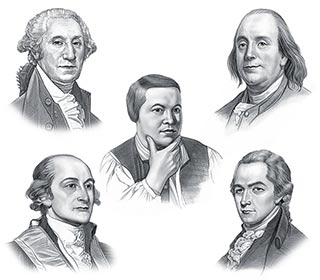Government in the Colonies - Charter Colonies
The Charter Colonies were written contracts between the British King and the American colonists. The Charter Colonies were Connecticut, Massachusetts (Charter then Royal) and Rhode Island.
Government in the Colonies - Royal Colonies
The Royal colonies were administered by a royal governor and council that was appointed by the British crown. The Royal colonies were New Hampshire, New York, New Jersey, Virginia, North and South Carolina, and Georgia.
Government in the Colonies - State Constitutions
In 1776 Congress advised all the colonies to form governments for themselves and the legislative assemblies in the formerly British colonies began adopting new constitutions to become independent states.
Government in the Colonies - House of Burgesses
The House of Burgesses was where elected representatives of English colonists first assembled to debate and pass laws in the new colony of Virginia. The House of Burgesses was a a bicameral legislature and a model for congress and was the first representative governmental body in America.
Government in the Colonies - The Continental Presidents
The Continental Presidents acted as an administrative head of state presiding as an impartial moderator, over meetings of Congress.
Government in the Colonies - Continental Congress
The Continental Congress was the first national government of the United States during the American Revolution. The Continental Congress initiated Nonimportation Agreements, formed the Continental Association, created the Continental Army. It was the Continental Congress that issued the Declaration of Independence and framed the Articles of Confederation.
Government in the Colonies - The Founding Fathers
The Founding Fathers of the United States of America were prominent statesmen and political leaders who participated in the American Revolution by Signing the Declaration of Independence, Framing and establishing the Constitution or participating in the American Revolutionary War.
Government in the Colonies - Colonies to States
The fall of the royal governors effectively ended colonial government. Continental Congress advised all the colonies to form governments for themselves.
Government in the Colonies - State Land Claims
Some of states had land claims they wanted recognized and refused to ratify the Articles of Confederation until the state land claims were settled.
Government in the Colonies - Articles of Confederation
The Articles of Confederation was the first governing document and the original constitution of America. The Articles of Confederation contained the terms, agreed by the 13 new states, by which they agreed to participate in a centralized form of government, in addition to their self-rule. Under the Articles of Confederation each of the states retained their "sovereignty, freedom and independence."
Government in the Colonies - the Declaration of Independence
The Declaration of Independence was signed by 56 delegates to the Continental Congress and stated the reasons the 13 American colonies wanted to be free of Great Britain's government. Declaration of Independence declares that all people are created equal and have rights to life, liberty and the pursuit of happiness. The Declaration of Independence states that the authority to govern belongs to the people, rather than to kings.
